Showcasing our LatAm CAPE network
We are proud to work with a diverse group of academics, businesses, and students in New Zealand and Latin America. Read more about the people involved in our work and the impact that our programmes have had on their lives.
It will be updated throughout the year. Click on photos to read more.
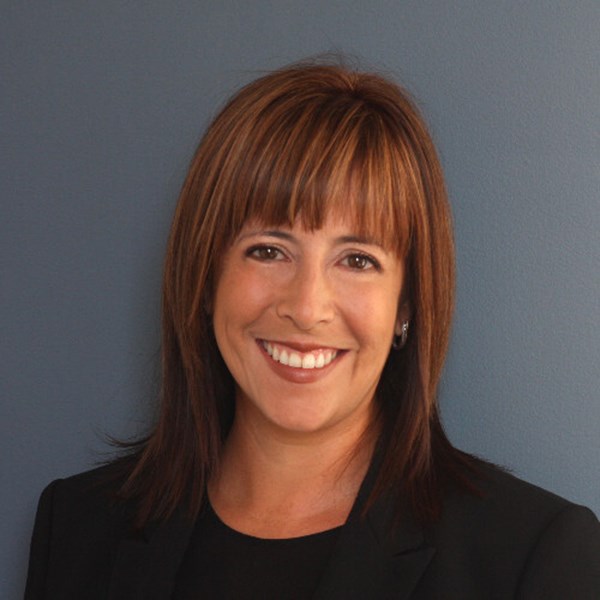
Tell us about yourself.
I am someone who has the best job in the whole world. I am the Chief Excitement Officer for Young Enterprise, a charity that works to unleash the entrepreneurial spirit of high school students. I get to see the potential that young people have and to help them on their journey. I used to say that young people are our future. The more I work with them, the more I realise that they are not the future -- they are today’s innovators and changemakers. And our job is just to help guide and encourage them on their way.
What is your connection to the LatAm CAPE?
At Young Enterprise, we have been partnering with LatAm CAPE since late 2017 to jointly provide an immersive learning experience to our students. It’s a wonderful partnership where we have been able to open the eyes of over 60 high school students to the wonders of Latin America and entrepreneurship.
Prior to lockdown, we were taking groups of students overseas on a life-changing experience. We visited local companies as well as NZ companies with a local involvement. We connected with local students and immersed ourselves in language and cultural experiences. We culminated each trip with both a business challenge as well as a cultural challenge.
Obviously Covid-19 meant that this overseas trip was impossible for 2020, so we pivoted and provided the next best thing – a similar experience throughout New Zealand, but still connecting with businesses that do business in Latin America.
Has your perception of Latin America changed as a result of your work with the LatAm CAPE?
Absolutely! While the trips are designed with the students in mind, what I’ve found is that I personally have learnt so much myself in the process. I’ve been fortunate to have personally chaperoned trips to São Paulo, Brazil as well as Santiago, Chile and I have enjoyed both the business visits as well as the cultural experiences.
In all cases, my fellow chaperones have also come away buzzing from the experience and bringing the learnings they have back to New Zealand to influence other teachers and students.
What’s your favourite LatAm CAPE memory?
I’m so torn on picking just one.
My favourite business visit has to be the whole day we spent with Craig Bell, a Kiwi who has co-founded a dairy company in Brazil called Letissimo. His stories and lessons were amazing and I was just mesmerised listening to him for the whole day.
From a cultural perspective, my favourite would have to be the capoeira class that we attended in Sao Paulo, Brazil. The first time we did it, the experience was completely new to me. In addition, I loved watching the real and authentic connection that our Māori students in particular felt with the whole thing.
What opportunities do you see in Latin America for New Zealanders?
I think the possibilities and opportunities are endless. There is so much business that can be done and it’s such a massive market for New Zealanders – whether it’s about setting up your own company, helping the company you work for to do business in Latin America, or actually moving over there and working for a local company. I think the first step is to start with a small introduction and see what takes your interest. And that’s where the experiences that we offer in partnership with LatAm CAPE come into play.
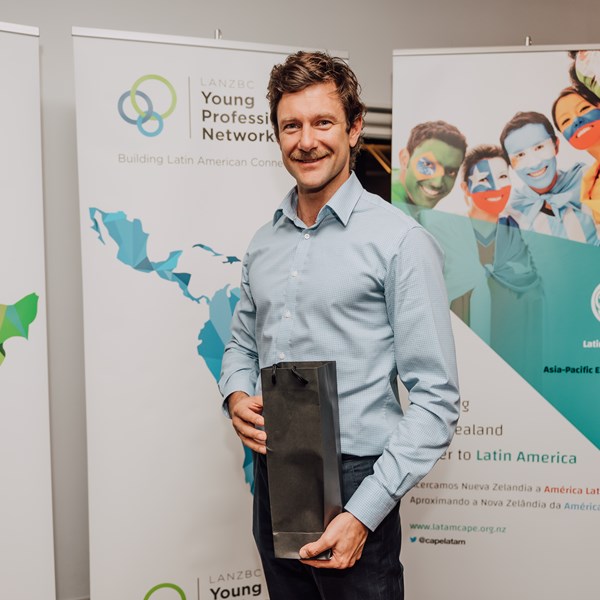
Tell us about yourself.
I wear a few hats, I am an economist, co-founder of buildBIM, a transnational architecture and design management company, President of the Latin American NZ Business Council and Producer on the large-scale art projects Antarctica - While you were sleeping (NYC 2019 & Auckland 2016) and Amazon - Raised Up Sky (2020).
What is your connection to the LatAm CAPE?
I first encountered the LatAm CAPE through my work at LANZBC. The CAPE had agreed to contribute to our proposed LANZBC Young Professionals Network (just launched!). Through better understanding the CAPE's objectives, I have since been lucky enough to gain their support on an art project, with the NZ artist Joseph Michael, titled Amazon - Raised Up Sky.
What has been the biggest impact for you as a result of your involvement with the CAPE?
The CAPE has allowed us to develop projects which otherwise would be very difficult to achieve, or at least carry out on a smaller scale with much less impact. The LANZBC Young Professional Network is of huge significance to the Council, providing the enthusiasm and energy necessary to leverage the strong Latin American business connection we have within the Council, while also supporting the latest generation of business people and entrepreneurs to build further connections with the region.
With respect to the Amazon Raised Up Sky project, the CAPE provided invaluable advice and support as well as encouragement to produce a documentary film and take the project right across the country, where we might otherwise have focused solely on NZ's major centres. The CAPE also supported the idea of merging the project with a similar work on Tāne Mahuta and Northland Kauri trees which has emphasised the parallels between Brazilian and NZ peoples and relationships with our most awesome trees.
How do you think the work of the CAPE helps contribute to increasing New Zealanders' knowledge and understanding of Latin America?
The CAPE provides the opportunity for people with and without a pre-existing interest in Latin America to discover or further develop these through its numerous projects every year. Projects that focus on business, educational and cultural links and are of an interest to a wide cross-section of the New Zealand public.
I think New Zealanders are easily inspired by Latin America and it doesn't take much to spur their interest in the region. Similarly, I believe that Latin Americans are fascinated by New Zealand and Australasia. We are both young colonial countries with complex histories, huge natural resources and wealth; we share one very large ocean and multiple cultural connections.
The CAPE's support for initiatives that promote knowledge and understanding of Latin America and its opportunities, I believe has increasing returns. New Zealanders and Latin Americans have a natural gravitation towards each other. CAPE projects provide the gentle 'nudge' that can strengthen this trend and help build further cultural and business ties between our countries.
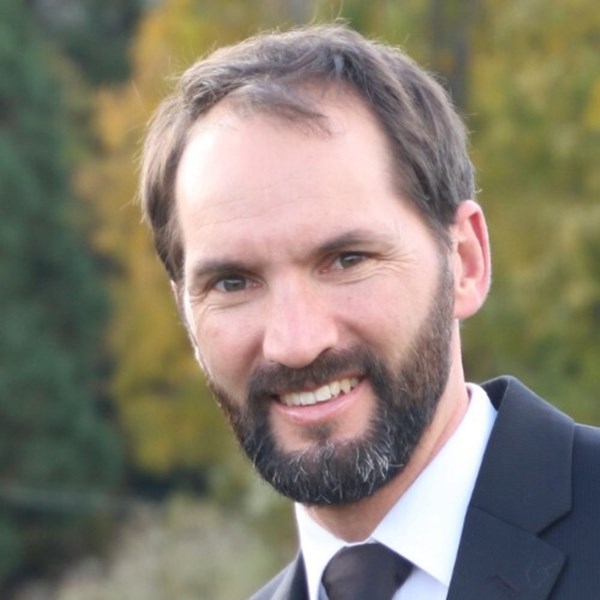
Tell us about yourself.
My name is Brendan Mahar, and I am the Latin America Market Manager at New Zealand Trade and Enterprise (NZTE). I am also a long- standing Ex-Officio Director of the Latin America NZ Business Council (LANZBC). Outside of my core work focus I am a keen sportsperson and my wife and I love getting out into the outdoors with our two young boys.
What interests you about Latin America, how did you end up working with this region?
My interests in Latin America are both personal and work related. My wife is an Argentine and we met in the United States. We have essentially “lived” between NZ and Latin America for more than a decade, and I have taken several opportunities to live and work in the region. In the mid 2000’s I pivoted my career and chose to work at NZTE with the goal of developing the commercial relationship between NZ and Latin America. I wanted to play a part in that developing relationship. NZTE provides me with a unique opportunity to have a foot both in NZ and in Latin America and work with many exciting NZ businesses that are established in Latin America or just commencing their business adventure there. I have a vested interest in this relationship as my young children will grow up to have dual identities, both New Zealand and Latin American.
What does your agency do and how do you collaborate with our Centre?
NZTE’s purpose is to “Grow companies internationally, bigger, better and faster, for the good of New Zealand”. We can't prosper as a country by selling to ourselves, so we need to diversify and enhance the value of our goods and services exports, and attract smart investment. By working towards our purpose, NZTE helps to make both of these things happen, for the good of all New Zealanders. Our value proposition to companies is around growing their capacity and unlocking their potential for international growth; Boosting their global reach through our teams and networks; Investing in their growth potential through attracting investment into companies; and Connecting to other businesses to help them succeed. We work collaboratively with the Latin America CAPE to determine activities and direction of effort that can support both our agencies purposes. Some of the activities we both deliver are complimentary to one another.
What opportunities do you see in Latin America for New Zealanders?
Simply, there is just no shortage of opportunities for New Zealand business with Latin America. The challenge is matching opportunity to willing and capable partners. Latin America is a vast and rapidly developing region in the world. NZ has many companies that have goods and services that could well find markets and flourish in the region. But that requires focus, effort, perseverance and investment, as well as some appetite for risk.
Many NZ companies see many opportunities around the globe and so we work with them to determine which markets to focus their business growth upon. I hope as the NZ business community grows and becomes stronger that we will see increasing trade and investment between NZ and Latin America. The commercial foundations are there, and we are looking to accelerate the growth.
How do you think the work of the CAPE helps contribute to increasing New Zealander’s knowledge and understanding of Latin America?
The Latin America CAPE is in a unique position in NZ to provide activities and programmes to develop and grow New Zealander’s knowledge and understanding of Latin America. The CAPE have a dedicated focus on the region and the resources to take on this challenge. Anything they do contributes to the growth, and that can be through an interaction with one, or a group of students through to publicly available collateral and stories that talk to the relationship between NZ and Latin America. It all helps, to build on what has come before and to shape up what is to come.
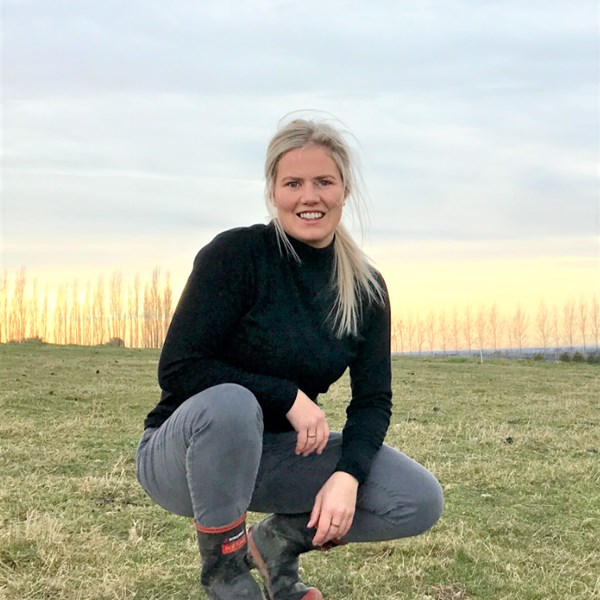
Tell us about yourself.
My name is Sarah How, and I grew up on a mixed cropping farm in beautiful Mid Canterbury. I was lucky enough to go on an AFS exchange to Spain for my final year of high school, and learning Spanish has opened up a number of doors for me. While studying agriculture at Lincoln University, I worked a summer on a dairy farm in Southern Chile for a New Zealand investment group. Since then, my career has seen me exposed to New Zealand’s agritech (especially seed) export markets in Latin America; government, education and export strategy; and further formal language and culture study. I recently completed research in the form of a Masters thesis (in Spanish) on intercultural competence and its impact on business relationships, using New Zealand dairy sector investors in Southern Chile as a case study. These work and study experiences have allowed me to explore a number of Latin American countries with an agricultural investment and export market lens -- and I have loved every minute of it.
What is your connection to the LatAm CAPE?
I was in the first batch of students to take part in the LatAm CAPE Market Insights Programme (MIP), in 2018. I was matched with the Ministry for Primary Industries and worked for them as an intern investigating Mexico as an emerging market for Māori agricultural exports. This internship was an amazing experience that allowed me to connect with people who are influential to New Zealand's trade outcomes, and it allowed me to see where government and agri-export strategy begins. Furthermore, the fortnightly seminars that the CAPE ran for us all on the programme were extremely worthwhile. We were able to meet and hear valuable insights from a range of experts who have experience working across cultures.
Did the programme influence what you want to do professionally in the future?
This programme had a huge influence on the direction of my career, because at that time I was working in a farmer-facing advisory role and had not had the opportunity to 'look up' and be part of agri-export strategy New Zealand. It also confirmed to me how important it is that we understand our own values as a nation and continue to build on our ability to work with other cultures - and this led me to completing my Masters thesis. My role at DairyNZ now allows me to work on sector-wide people capability and strategy everyday. I am on a path where I hope to have an impact on the intercultural competence of New Zealand business stakeholders and our ability to engage with Latin American markets.
Has your perception of Latin America changed as a result of your work with the LatAm CAPE?
There is no doubt that it has. I have always loved Latin America, but this programme helped me better understand how the history and collective values of a nation shape how people behave and interact. This has helped me demystify why New Zealanders and Latin Americans may do business differently - why relationships are so important in Latin America, why corruption may be more prevalent, how social cues may be different and therefore misunderstood, etc. Better understanding the source of these differences certainly helps to explain what you are experiencing when you work in that market!
As a result of the work you have done with the CAPE, do you feel it has increased your understanding of how to do business in Latin America?
Absolutely. My internship with the Market Insights Programme allowed me to explore how we could engage with Latin American markets (studying demographics, market trends, marketing opportunities, distribution channels) while the CAPE seminars demonstrated real-life examples of successes, failures, and the opportunities and challenges of doing business with people belonging to Latin American cultures.

Tell us about yourself.
I’m David Schurmann, director of Little Secret, 2017 Brazil’s official Oscar selection for Best Foreign Language Film, first showed a passion for film making at the age of 13, while filming his family’s around the world expedition. He got his formal education in Cinema in New Zealand. After graduating at the age of 19, he was hired to direct programs for TV3 and TVNZ- New Zealand. David returned to Brazil in 1997 to direct a successful 34 episode documentary film series for Globo TV. In 2007 he directed the documentary film The World Twice Around which took prestigious national and international awards. Since then, he has directed various other international films and documentary series.
What is your connection to the LatAm CAPE?
I was the Director and Producer of the series ‘The Inside Guide: Exploring Kiwi Success in Brazil.’
What has been the biggest impact for you as a result of your involvement with the LatAm CAPE?
I got to discover and meet some amazing Kiwis in Brazil and was able to share their rich stories and hints on how to do things in Brazil. The series also brought me back to New Zealand where I was able to give three master classes to film students. Giving back to NZ was an amazing and gratifying experience. Another very rewarding moment was having Brazilian and Kiwi teams working together, sharing their cultures; I believe it was enriching to all involved.
Tell us about some of the things you feel are most common, and most distinct between New Zealand and Latin America?
Brazilians and Kiwis have a “get it done” attitude, no matter how big the challenge is and have a very positive and creative mindset in finding solutions. Both cultures love human interaction (although they show it in different ways). Brazilians tend to be more physical and easy-going, they are also more passionate and vocal. Kiwis are extremely polite and quiet, totally organized and very community-focused.
How do you think your collaboration with the LatAmCAPE and your specific project help contribute to increasing New Zealanders’ knowledge and understanding of Latin America and their ability to engage with the region from a business perspective?
I believe the Inside Guide series was able to give Kiwis a glimpse of what it’s truly like to live, work, and do business in Brazil. It was especially so, because we featured Kiwis that have lived in Brazil for a long time and were able to share all their knowledge and information in an honest and true way. The series was entertaining and informative, which facilitates audience engagement and understanding. We also consulted with professors, which in turn gave us an academic basis for some of the subject matter on the series.
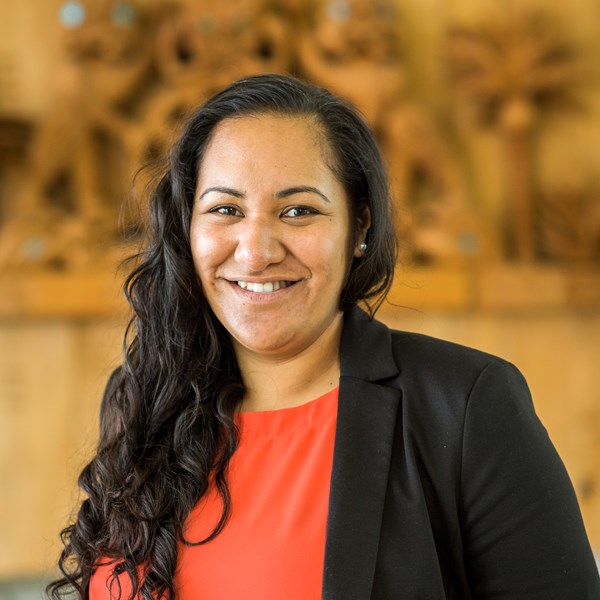
Tell us about yourself.
Kia ora, Kia Orana, Iorana. Ki te taha o tōkū māmā he uri tēnei no Te Arawa me Maataatua waka. Ki te taha o tōkū pāpā no Ngā Kuki Airani me Tahiti hoki. E noho ana ahau ki Kirikiriroa. Ko Natalie Maramena Lulia tōkū ingoa.
Hello/Greetings. I hail from Te Arawa and Mataatua canoes on my mother's side. I also hail from the Cook Islands and Tahiti on my fathers side. I currently live in Hamilton. My name is Natalie Maramena Lulia.
What is your connection to the LatAm CAPE?
I have worked with the LatAm CAPE since 2018. I am the Project Leader for the Te-Hononga-ā-Kiwa (Strengthening Māori Business Capability) Programmes and I also recently became the Programme Manager for the CAPEs at Te Whare Wānanga o Waikato/University of Waikato.
How has your involvement with Latin America CAPE grown your intercultural competence?
My involvement with the LatAm CAPE has provided the opportunity to connect across education, business, private and public sector and particularly with indigenous whānau, specifically in support of Māori Business aspirations. Being part of the exciting and important kaupapa has provided me the opportunity engage meaningfully - I have grown competence around current and future challenges that are faced in the region and what the aspirations are for development in the region and the possibilities that exist for different groups across Aotearoa to establish reciprocal connections in Latin America.
Has your perception of Latin America changed as a result of the programme?
I knew very little about the Latin America region prior to my mahi with the CAPEs, in fact I probably couldn't name many of the countries, so my perceptions/knowledge and interest in the region has changed dramatically. I'm excited about continuing to explore and learn more about the cultures across Latin America and the many opportunities there are for Aotearoa in the region. I definitely have a better appreciation of the business, cultural, political and environmental landscapes and where the similarities and difference lie across the region.
What’s your favourite LatAm CAPE memory?
I really can't pick a favorite because there truly has been so many great memories, however I will highlight that it has been such an amazing experience to deliver the Te Hononga-ā-Kiwa Programme. My favorite aspect of this Programme has been building meaningful relationships with indigenous whānau in Latin America, experiencing sacred and unique cultural practices and protocols and celebrating the value of indigenous knowledge systems and perspectives. I'm personally passionate about whānau empowerment and how Māori and Indigenous knowledge systems create spaces for intergenerational leadership, so it has been an amazing for me to experience this with other indigenous whānau across the world.
If you had to share one thing about Latin America to New Zealanders, what would it be?
I've only been able to experience a very small part of what Latin America has to offer, and the small part that I have experienced has been such a privilege. The culture is rich and if you are willing to spend the time exploring the landscape you will find beauty in so many shapes and forms. Indigenous whānau over in Latin America share many of the same values and principles we do here in Aotearoa, which has allowed meaningful connections to be made, underpinned by values such as whanaungatanga, kaitiakitanga and manaakitanga.
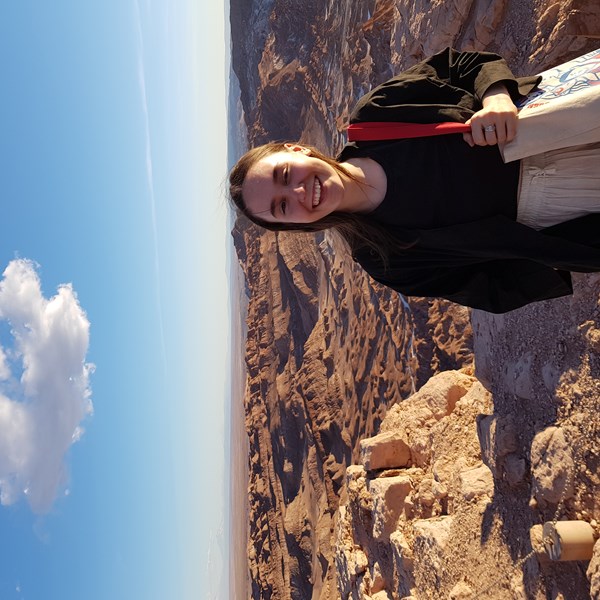
Tell us about yourself.
Kia ora, I’m Laura – a 21 year old student raised in and still living in Te Whanganui-a-Tara/Wellington. I’m currently finishing my studies in Sociology, Environmental Studies and Māori Studies at Victoria University of Wellington. I also work at a creative agency which makes films and digital content for organisations that are campaigning for social change. In my free time I volunteer in the movement for climate justice.
What is your connection with the LatAm CAPE?
Last year I interned for 5 months at the Chile Pacific Foundation while it organised the meetings of the APEC Business Advisory Council (ABAC) during Chile’s APEC host year. This opportunity was organised and funded by the LatAm CAPE.
Has the programme influenced your study and career plans?
While in Chile I became infatuated with the country, and I ended up applying to finish the final year of my degree on exchange in Santiago. I can definitely see myself returning to do a Masters or to work there.
Working in the area of trade and international negotiations has also shaped my career aspirations. My internship in Chile definitely empowered me to take a more active role in promoting access to knowledge and decision-making around trade for structurally oppressed communities, and that’s a kaupapa I’d like to dedicate myself to going forward. My internship was basically a crash course in trade, globalisation, and international-level negotiation, and now I’m trying to build on that knowledge so that I can make sure it’s spread more equitably.
When I returned from interning at ABAC Chile I got the opportunity to complete a follow-up internship at the Ministry of Foreign Affairs (MFAT) working in their APEC Division. This follow-up internship really consolidated the skills and knowledge that I had been building in Chile, and it was also useful to experience the system of APEC from the perspective of both Chile and New Zealand. I’m really grateful to have gotten the chance to gain public sector experience at MFAT, and that opportunity was a direct result of the LatAm CAPE programme I completed in Chile.
How has your view of Latin America changed since participating in the internship?
My internship in Chile was my first time setting foot in Latin America, so before I left I spent a lot of time connecting with New Zealanders who had lived in the region, asking to hear from their experiences. The answer I got consistently was that Latin America is a continent of contrasts, and I don’t think you can really understand the meaning of that answer until you spend time there yourself. Obviously Latin America is a huge region, and its sheer size alone explains the enormous cultural, economic, political, and geographical contrasts of the continent. But I also think that Latin America is a continent that embraces plurality: the idea that multiple, bizarre truths can exist at once. I tried for a long time to articulate what I mean by this, but I think it’s something that can only be experienced by visiting Latin America.
As a Sociology student I was delighted to discover a huge canon of incredible Latin American social theorists that I had never heard of before. That’s where I think speaking another language becomes such a huge advantage: it gives you access to a whole new system of knowledge and culture.
How has your involvement with LatAm CAPE grown your intercultural competence?
Living and working in Chile taught me the extent to which the environment where I grew up and was socialised was just a particular cultural context. I think that living in a country with different cultural and linguistic norms to your home country is the ultimate lesson in humility. There were many moments in the workplace in Chile where my first instinct was to judge a situation against the context I was familiar with, before eventually realizing that I had gotten the complete wrong end of the stick.
I think I’m now able to recognise that there is no such thing as cultural neutrality, and that helps me to form more reciprocal and authentic intercultural relationships.
What ways have you continued to apply the new language skills you acquired during the programme?
I’m obsessed with finding ways to integrate Spanish into my life in New Zealand! Since I’ve been unable to return to Chile on exchange, I’ve had to adapt and try to achieve the same thing over here. I also have Spanish classes twice a week with a teacher I met while travelling in Colombia last year.
Speaking Spanish has also been an asset to me in the workforce. In my current job, working at a creative agency with a lot of international stakeholders, I was asked to do some translating work during my first month on the job. During my internship at MFAT I would switch between English and Spanish constantly during my workday, and I was able to work on projects that I wouldn’t have been assigned to without that language ability. I think speaking another language demonstrates a good work ethic, a commitment to continual learning, and the ability to practice cultural humility.
You never know when you’ll run into someone who speaks Spanish, and I find that speaking someone’s native language to them is the easiest way to form a connection with them. Now that I’m back in Wellington it’s like a whole new city to me: I’ve discovered a network of new Spanish-speaking friends that I never would have met otherwise, and a rich Latinx cultural scene. (The ‘x’ is reflective of the rise in the use of gender-neutral Spanish)
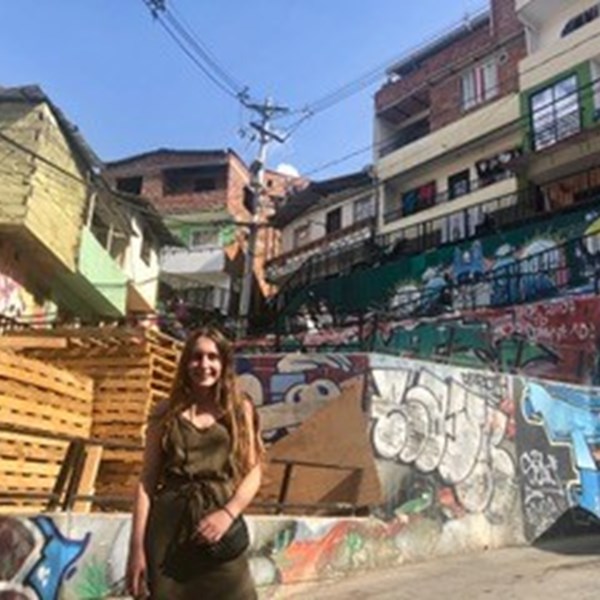
Tell us about yourself.
My name is Jemima Peck. I am a second-year student at Otago University, studying a Bachelor of Commerce with a double major in International Business and Marketing. I am from Hawke’s Bay originally.
What is your connection to the LatAm CAPE?
I travelled to Colombia with LatAm CAPE in January of 2019 as one of 8 students selected for the LatAm Biz: Entrepreneurship in Colombia through the Young Enterprise Scheme (YES) ‘Entrepreneurs in Action’ weekend. This event required us to work with 80 students from across the country on three challenges and compete for a spot in one of the CAPE funded and designed LatAm Biz trips. I travelled to Medellin alongside 7 other students who I did not know prior to the trip. Together, we spent 9 days engaging and learning about business and entrepreneurship in Colombia. The LatAm Biz trip consisted of company visits, guest speakers, local cuisine, dance lessons, siteseeing, Spanish lessons, and a business challenge.
What ways have you continued to apply the new language skills you acquired during your LatAm CAPE programme?
Prior to my involvement with LatAm CAPE, I had never had any desire to learn a language in the slightest. The moment we stepped out of the Airport in Medellín, I was instantly inspired by Lucy O’Neill who was organising our group transport into the city. I was amazed by her fluent language skills and ability to communicate and organise everything with such ease in Spanish. We were fortunate enough to receive daily Spanish classes with a professor at Universidad de EAFIT who equipped us with basic words and phrases which we were challenged to use throughout the week. These lessons fostered my initial passion for the Spanish language. I then decided to pursue learning Spanish when I returned home from Medellin, by incorporating Spanish into my degree through a major in International Business. I had never considered learning a language at University and I was not expecting my degree to be so heavily influenced by the trip. I am currently completing my 4th paper in intermediate Spanish to meet the language component requirements of my major.
Has your perception of Latin America changed as a result of the programme?
I had absolutely no idea what to expect when I was selected for the trip to Medellin. I had never heard of anyone travelling there and no one I’d discussed it with knew much about Colombia. My perception of Colombia definitely shifted from what was portrayed on Google when I was researching where we were travelling to, in comparison to what I experienced for myself. Although there are many significant differences between New Zealand and Latin America, I was definitely surprised at how much we have in common.
How has your experience impacted your life? In what ways do you see it still show up in your everyday?
Aside from inspiring me to learn Spanish and desperately wanting to return to Latin America, my favourite thing that I took away from my experience was the friendships. I have seven super close friends from around New Zealand who are bonded by our travels and our shared passion for business and entrepreneurship. I keep in regular close contact with 3 of the Kiwi students who I know will be lifelong friends. We were also fortunate enough to have 4 Colombian students from La Universidad de EAFIT join us for our 9 days in their city. I am in regular contact with 3 of the 4 students, Lina, Miguel and Diego, who I now consider to be close friends despite our physical distance, keeping in touch through Instagram, Snapchat and video calls. They are awesome at helping me to practice Spanish and recently we have been catching up about Coronavirus (COVID-19) in Colombia which has been interesting.
Has the programme influenced what you want to do professionally in the future?
I ended up with a completely different degree plan upon returning from my trip with LatAm CAPE and YES. I never expected to be so heavily impacted by my time in Medellin. When we returned from the trip, it was around the time that I needed to finalise what I wanted to study. The LatAmBiz Programme completely changed my direction and future ambitions, leading me to learn Spanish which I hope to pursue further with an exchange in my last year of study or an internship when I graduate.
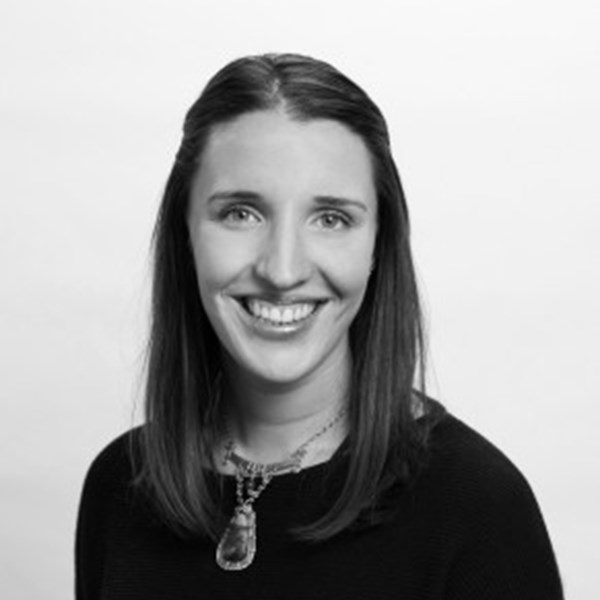
Tell us about yourself.
I studied film and English literature at Victoria University of Wellington, after which I carried out my legal training (LLB) at the University of Auckland. I am a creative thinker who has worked in both the media/communications and research spaces. I am driven to create multidisciplinary work that moves people on an intellectual and/or emotional level. Career highlights so far have included working as a Communications Consultant for the United Nations Development Programme in Santiago, Chile, as well as founding the world's first and only poetry exhibition in Antarctica (antarcticpoetry.com) following on from my PgCert in Antarctic Studies at the University of Canterbury.
Currently, I am working as the Head of Marketing and Communications for Inspiring Stories, a social enterprise which backs young New Zealanders to change the world. Most recently, I've also been using my spare time to lead the Latin America New Zealand Business Council's Young Professionals Network ("LANZBC YPN"), do documentary research for Patrick Gower, produce a livestream festival show on Twitch to an audience of about 800,000, and attempt to teach myself piano.
What interests you about Latin America, how did you end up working with this region?
I've always felt a strong familial tie to Latin America. My great-granduncles migrated to Argentina to start a new life in the early 1900s after the Boer War in South Africa. As a teenager I was also deeply drawn in by Latin American music. The combination of both influences led me to decide to study Spanish at high school with the aim of visiting Latin America, which I finally did while I was at university. Seeing the beautiful nature, learning more about the political history and experiencing the warmth of the people has kept me going back.
I was lucky enough to be awarded the Prime Minister's Scholarship for Latin America to study at the Pontifical Catholic University of Chile in Santiago, Chile. That opportunity led me to network and find a research assistant role at a respected think tank which led to the opportunity to work at the United Nations until the Chilean political unrest broke out in late 2019.
What is your connection with the LatAm CAPE?
The LatAm CAPE is a highly valuable, strategic supporter of the recently launched LANZBC Young Professionals Network (YPN). The LANZBC YPN is a fantastic initiative which aims to help young professionals aged 18 to 35 deepen their professional and cultural ties to Latin America. At the end of last year we launched our first branch in Auckland, this year we will focus on rolling out further branches in both Wellington and Christchurch, and on our exciting calendar of events.
What has been the biggest impact for you as a result of your involvement with the CAPE?
He aha te mea nui o te ao? He tangata, he tangata, he tangata. It has been fantastic to build relationships with the LatAm CAPE team members and receive their mentoring, feedback and encouragement to build the foundations of a sustainable, meaningful and deeply impactful young professionals network.
What opportunities do you see in Latin America for New Zealanders?
Despite the current unprecedented climate, Latin America remains a region full of untapped potential. The particular opportunities available depend both on the country, the sector and the individual. However, New Zealanders benefit from a deeply ingrained number 8 wire mentality, which means that with the right contacts, the right knowledge and the right support young New Zealanders can thrive and build opportunities for themselves in almost any sector.
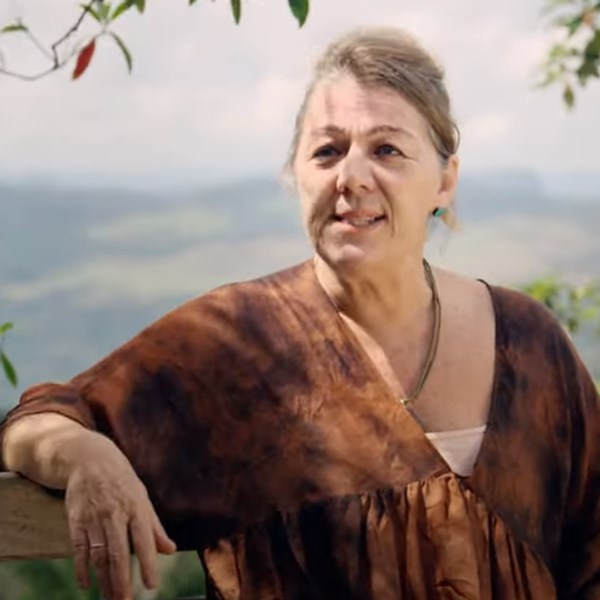
Tell us about yourself.
I am a New Zealander who lived and worked in Brazil over a 40-year time span. I originally went as a Rotary exchange student, in fact, the first NZ exchange student to go to Brazil. I fell in love with the country and after a few years studying and working in NZ, I returned to Brazil. During my working life in Brazil, I generally did consultancy work and information transfer projects, identifying sectors of the Brazilian professional environment, which needed expertise for development, and then identifying experts from different countries, to provide this information.
At this moment, I live in the Far North of New Zealand where I am preparing an enterprise aimed at the NZ market, where in the future I plan to use Brazilin materials for this new product.
For a period of nearly 10 years, I promoted NZ in Brazil, and supplied information to the NZ supply chain regarding this new and unknown sector. As a consequence, Brazil, which is an enormous and very lucrative market, became an important trading partner for NZ tourism and education. Through these incentives, many other trading opportunities, including government involvement were initiated.
In later years, I had other business experiences, based on the ESL sector before buying a 250-acre property in the highlands of the state of Minas Gerais. Here, I began an environmental project, involving reforestation to encourage the native wildlife back to their natural environment, and awareness programs so as the people of the region were motivated to value their native flora and fauna. Although I am now back in NZ due to the Covid - 19 pandemic, this project is on-going. Fire control is now the major activity seeing that the trees have successfully rejuvenated and the wildlife, amongst them endangered species, is now evident with constant and significant sightings.
What is your connection to the LatAm CAPE?
The LatAm Cape made a documentary film, which highlighted 5 New Zealanders who had worked in Brazil. This documentary was made by a very well-known Brazilian film maker, who, himself studied filmmaking in NZ. This documentary has been instrumental in providing sound information to young New Zealanders wishing to gain market entrance to Brazil. This information is based on the experience of 5 people from varying backgrounds and businesses.
How has being in the documentary affected your life? What kind of reception has it received?
This documentary has been extremely well received in both countries. The Brazilian side became aware of the difficulties and rewards I faced, which in turn created a higher respect for the work done. From the NZ side, I believe that it has been useful to illustrate the reality of working within a totally different culture, and the importance of adhering to local processes and values. In the making of this documentary, I became conscious that being a business pioneer in this country has given me an enormous resilience and business knowledge, which I can transfer to any other aspect of life that I chose. The most important lesson I learnt was that the value of cultural sensitivity and the understanding of differences is vital to succeeding in this very challenging domain. This shows up clearly now in my everyday life as I begin a new venture here in NZ. It has become evident that past experiences in a much more difficult market place has made this new venture much easier, due to the determination and self-belief I gained.
What opportunities do you see in Brazil for New Zealanders?
I see great opportunities in the import sector. Brazil has a wide range of products and due to the excellent exchange rate, there are many opening available. The wine industry, with appropriate and market -sensitive promotional strategies, is one sector that could be developed further. Solar power equipment as an import product, and construction materials such as bathroom and kitchen fittings, as well as landscape paving materials are also areas that could be investigated more, with Brazil manufacturing some excellent products, at very competitive prices.
Why do you feel Brazil is important to New Zealanders?
I feel they are very important to each other because they both have so much to teach and learn. They are cultures that complement each other and both regions have much to offer. Brazil, although somewhat older than NZ is comparatively young compared to European countries and is in a phase of development. This development could provide many opportunities to young New Zealanders. NZ´s progressive environment could benefit from new ideas originating out of Brazil’s innovative and ever-adapting business environment.
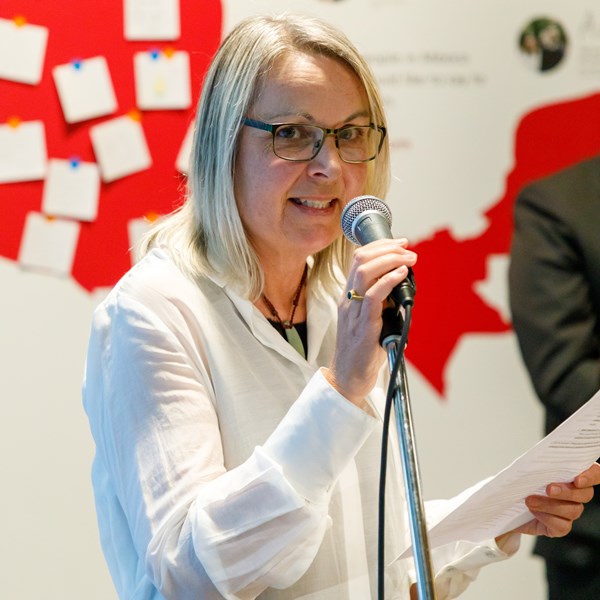
Tell us about yourself.
I’m an Associate Professor in Museum and Heritage Studies at Te Herenga Waka - Victoria University of Wellington. I first visited Latin America in 2013 when I went to Mexico to research the first ever exhibition exchange between Aoteaora and Mexico involving the exhibitions E Tū Ake: Standing Strong and Aztecs. This visit was the beginning of a long-term research project and collaboration with Professor Leticia Perez from the Escuela Nacional de Conservación, Restauración y Museografía based on our mutual enthusiasm for developing museum exhibitions that enhance intercultural understanding, empathy and openness to others’ perspectives. Our book Cosmopolitan Ambassadors: International exhibitions, cultural diplomacy and the polycentral museum (published in English in 2019 and Spanish in 2020) was awarded the Miguel Covarrubias prize for best research in museums by the Instituto Nacional de Antropología e Historia in Mexico in 2020.
What is your connection to the LatAm CAPE?
In 2020 I began a project with the LatAm CAPE called Cultural Partnerships for Intercultural Understanding working with Leticia Perez. This project aimed at strengthening cultural relationships between Aotearoa and Mexico through 9 internships for students and emerging museum professionals, workshops for cultural sector professionals throughout the country to learn about establishing intercultural partnerships and an exhibition about contemporary Mexican life and culture. Our exhibition De la Milpa a la Mesa: A Mexican Food Journey was presented at Te Auaha Gallery in Wellington from 3 March to 14 April 2021. It was created by interns and students from both Aotearoa and Mexico, working with Leticia, myself and professional mentors. Based in intercultural theory and practice, our aim was to create a space in which New Zealanders could hear Mexicans tell their own stories, and thereby gain a deeper understanding and appreciation of their rich culture and heritage. The exhibition received around 4500 visits in 6 weeks, including 150 students on school visits and many more people enjoying a ‘deep dive’ into Mexican culture through our various events and public programmes. The reception to the exhibition has been so positive that we are now offering it to tour to other venues around the country.
How has your involvement with the LatAm CAPE impacted you?
With the Cultural Partnerships project, we have been able to take ideas developed through research and apply them in practice. This had its challenges but has also been very exciting as we have been able to refine our practices and see their ‘real world’ impact in terms of building stronger cultural links between our two countries. It has been particularly rewarding working with young people in Aotearoa and Mexico and seeing their creativity and resourcefulness, as well as the relationships they have built which have been very collegial, respectful and authentic.
How has collaborating with academics in Mexico taught you about international collaboration and can you see it being applied in different sectors?
Collaborating with Leticia has been incredibly enriching, both personally and professionally. Working with someone with a different cultural background and perspective challenges you to question your own assumptions and ways of doing things constantly. I think it helps you to become much more flexible and open-minded, and what can be achieved by trying to reconcile or integrate two different perspectives I think is always more interesting than one perspective on its own. You also never know where international collaboration will take you. When we started working together, we never imagined we’d one day be creating our own intercultural exhibition. It’s that enduring and open-ended nature of cultural partnerships that I find particularly exciting and rewarding.
Has your perception of Latin America changed as a result of the programme?
It has not so much changed as reinforced my view of the warmth, creativity, and generosity of the people and the pride they have in their rich culture and in sharing it with others. I was deeply touched by the Mexicans who shared their stories and photos with us so we could include them in the exhibition, even though life is very tough for them now with the pandemic.
What opportunities do you think Latin America has for New Zealanders?
In my experience New Zealanders and Latin Americans work well together and there is a lot of goodwill and openness to each other’s culture. Being ‘emergent’ countries, which are sometimes overlooked by others, we share a certain flexibility and innovative approach and a genuine enthusiasm to share our cultures with and learn from others. Through our workshops with over 60 cultural and creative sector professionals, we found a lot of existing knowledge and enthusiasm for more cultural engagement between Aotearoa and Latin America. Creating more opportunities for exchanges, internships and collaborative exhibitions and cultural programmes can help New Zealanders engage with other cultures more effectively in all contexts, as well as helping us understand our place in the world and what we have to offer. I think cultural understanding, open-mindedness and empathy has to be the basis of any engagement with another culture, whether it’s in the arts, business or any other sector. Enhancing New Zealanders’ intercultural skills through engaging with Latin America is something of real value that our museum and cultural sector could be involved with.